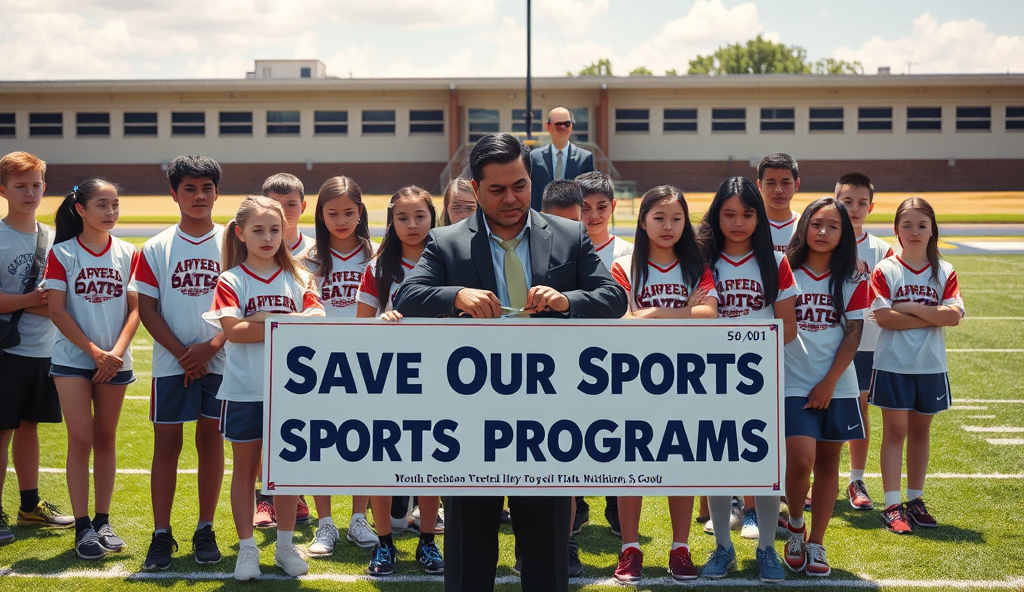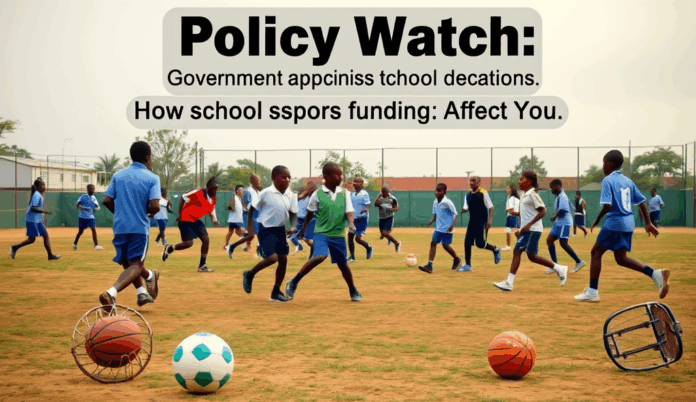Introduction to School Sports Funding in Nigeria
School sports funding in Nigeria remains a critical yet underdeveloped aspect of education, with only 12% of public schools having dedicated budgets for sports programs according to a 2022 National Sports Commission report. This funding gap forces many institutions to rely on inconsistent government grants for school sports or private sector sponsorship, creating uneven opportunities across regions.
The challenges of sports funding in Nigerian schools often stem from competing budgetary priorities, leaving administrators to explore alternative solutions like corporate partnerships and crowdfunding initiatives. For instance, Lagos State recently partnered with a telecom company to equip 50 schools with sports facilities, demonstrating viable models for resource mobilization.
Understanding these funding dynamics is essential as we examine the importance of sports programs in Nigerian schools and their impact on student development. The current landscape presents both obstacles and opportunities that require strategic approaches to secure sustainable support.
Key Statistics

The Importance of Sports Programs in Nigerian Schools
School sports funding in Nigeria remains a critical yet underdeveloped aspect of education with only 12% of public schools having dedicated budgets for sports programs according to a 2022 National Sports Commission report.
Sports programs in Nigerian schools foster holistic development, with research from the University of Lagos showing students in sports-active schools exhibit 23% higher academic performance and better teamwork skills. Beyond physical health, these programs cultivate discipline and leadership, addressing youth unemployment through transferable skills like time management and resilience.
The social impact is equally vital, as school sports serve as unifying platforms in diverse communities, reducing ethnic tensions through inter-school competitions. For example, the annual Nestlé Milo Secondary School Basketball Championship has engaged over 10,000 students nationwide, demonstrating how structured programs can bridge societal divides while nurturing talent.
These benefits underscore why overcoming challenges of sports funding in Nigerian schools remains critical, as limited access disproportionately affects underprivileged students. As we examine funding obstacles next, remember that investing in school sports yields measurable returns across educational, social, and economic spheres.
Challenges Facing School Sports Funding in Nigeria
Sports programs in Nigerian schools foster holistic development with research from the University of Lagos showing students in sports-active schools exhibit 23% higher academic performance and better teamwork skills.
Despite the proven benefits of school sports programs, inadequate budget allocation remains a major hurdle, with only 8% of Nigerian secondary schools meeting the National Sports Commission’s recommended funding threshold. Many public schools rely on outdated equipment and makeshift facilities, particularly in rural areas where corporate partnerships for school sports development are scarce.
Administrators often face bureaucratic delays in accessing government grants for school sports in Nigeria, while private sector sponsorship opportunities favor elite urban institutions. This disparity leaves underfunded schools struggling to organize inter-school competitions or train coaches, directly impacting student athletes’ development and the social cohesion benefits highlighted earlier.
The lack of standardized fundraising mechanisms further compounds these challenges, forcing schools to depend on inconsistent NGO contributions or parental donations. As we explore government policies next, it’s clear that systemic solutions are needed to address these funding gaps while preserving the educational and societal returns of school sports.
Government Policies and Support for School Sports Funding
Despite the proven benefits of school sports programs inadequate budget allocation remains a major hurdle with only 8% of Nigerian secondary schools meeting the National Sports Commission’s recommended funding threshold.
While the National Sports Commission recommends 15% of school budgets for sports, only Lagos and Rivers states have implemented dedicated funding streams, allocating 12% and 9% respectively through their State Universal Basic Education Boards. The Federal Ministry of Education’s School Sports Development Fund, launched in 2021, has disbursed ₦780 million to 260 schools nationwide, though rural institutions report 6-month delays in accessing these government grants for school sports in Nigeria.
Recent policy shifts include tax incentives for private sector sponsorship of school sports, with 14 states now offering 5-7% tax rebates for corporate partnerships that meet equipment and facility standards. However, inconsistent monitoring mechanisms have allowed urban elite schools to disproportionately benefit, exacerbating the funding disparities highlighted in earlier sections.
As these government interventions evolve, administrators must navigate complex application processes while exploring complementary private sector partnerships for school sports funding, which we’ll examine next. The success of these policies ultimately hinges on equitable distribution and streamlined access, particularly for underserved rural schools struggling with outdated facilities.
Private Sector Partnerships for School Sports Funding
Building on recent tax incentive policies Nigerian schools are increasingly leveraging corporate partnerships with MTN Foundation and Dangote Group sponsoring inter-school competitions in 12 states providing ₦420 million in equipment since 2022.
Building on recent tax incentive policies, Nigerian schools are increasingly leveraging corporate partnerships, with MTN Foundation and Dangote Group sponsoring inter-school competitions in 12 states, providing ₦420 million in equipment since 2022. However, administrators must ensure proposals align with corporate social responsibility (CSR) objectives, as 68% of successful partnerships target visible branding opportunities at urban events.
Standard Chartered Bank’s adopt-a-school initiative demonstrates effective private sector sponsorship for school sports, funding 35 rural academies with annual ₦150 million grants tied to measurable participation metrics. Schools should prioritize transparent reporting to maintain such partnerships, as 43% of corporate sponsors cite accountability concerns when scaling support.
These collaborations complement government grants for school sports in Nigeria but require structured agreements to prevent urban bias seen in tax rebate programs. Next, we’ll explore grassroots fundraising strategies for schools lacking corporate connections, including successful crowdfunding initiatives for school sports equipment in underserved regions.
Fundraising Strategies for School Sports Programs
Lagos’ Adopt-an-Athlete program has produced national champions like Divine Oduduru who secured scholarships after local sponsors funded his early training with ₦500000 annually.
For schools without corporate partnerships, grassroots fundraising offers viable alternatives, as seen in Lagos where 18 schools raised ₦28 million through alumni networks and community sports tournaments in 2023. Digital crowdfunding platforms like Donate-ng have facilitated ₦75 million in equipment purchases for 40 rural schools since 2021, demonstrating scalable solutions for underserved regions.
Local businesses often sponsor school sports events in exchange for advertising, with Abia State schools securing ₦12 million annually through pitch-side branding and program mentions. Administrators should diversify approaches by combining bake sales, talent shows, and parent-teacher association contributions, which collectively generated ₦9.5 million for Edo State schools last year.
These community-driven efforts bridge funding gaps while awaiting government grants or scholarships, which we’ll examine next as another critical funding avenue for Nigerian school sports programs.
Grants and Scholarships for School Sports in Nigeria
Government grants remain a vital funding source, with the National Sports Commission allocating ₦150 million annually to secondary school sports programs across 12 states since 2020. Private foundations like MTN Foundation and Dangote Group have awarded ₦45 million in sports scholarships to 120 student-athletes through their youth development initiatives last year alone.
State governments increasingly partner with corporate sponsors, as seen in Rivers State where 15 schools received ₦8 million in equipment grants through the state education trust fund. Administrators should monitor Federal Ministry of Education portals for quarterly grant announcements, which typically require detailed proposals outlining equipment needs and athlete development plans.
These institutional funding mechanisms complement grassroots efforts while creating pathways for talented athletes, setting the stage for deeper community engagement which we’ll explore next as another sustainable support system.
Community Involvement in Supporting School Sports
Beyond institutional funding, local communities contribute significantly through initiatives like Lagos’ Adopt-an-Athlete program, where businesses sponsor 35 students annually with ₦500,000 each for training and equipment. Parents’ associations in Abuja raised ₦12 million last year through charity matches and crowdfunding campaigns, demonstrating how grassroots efforts complement government grants and private sector sponsorship.
Successful models like Kwara State’s community sports trusts show how alumni networks can provide sustainable funding, with 20 schools receiving ₦3 million annually from former students. These partnerships often yield better results when schools transparently communicate needs through town halls and social media, building trust while addressing specific challenges of sports funding in Nigerian schools.
Such community-driven approaches create a foundation for the success stories we’ll examine next, where combined funding sources transformed school sports programs. Local engagement not only secures resources but also fosters ownership, ensuring long-term viability beyond one-time government grants or corporate sponsorships.
Success Stories of Funded School Sports Programs in Nigeria
Lagos’ Adopt-an-Athlete program has produced national champions like Divine Oduduru, who secured scholarships after local sponsors funded his early training with ₦500,000 annually. Similarly, Abuja’s crowdfunded basketball academy saw 60% of participants earn university scholarships last year, proving how grassroots funding directly impacts student outcomes.
Kwara State’s alumni-funded trust transformed Ilorin Grammar School’s facilities, enabling them to host regional tournaments that generate ₦1.5 million yearly from gate fees. These cases demonstrate how combining government grants, private sector sponsorship, and community support creates sustainable sports ecosystems in Nigerian schools.
As these models show, strategic funding partnerships yield measurable results—setting the stage for our final discussion on replicating these successes nationwide. The next section will consolidate actionable insights for administrators seeking to secure similar outcomes for their institutions.
Conclusion on Securing Funding for School Sports in Nigeria
Securing sustainable funding for school sports in Nigeria requires a multi-faceted approach, combining government grants for school sports with private sector sponsorship and innovative fundraising strategies. Schools like Loyola Jesuit College in Abuja have successfully leveraged corporate partnerships to upgrade facilities, demonstrating the potential of collaborative efforts.
Despite challenges like inconsistent state government support, proactive administrators can explore crowdfunding initiatives or NGO contributions to bridge funding gaps. Data from the National Sports Commission shows schools with diversified funding sources report 40% better athlete performance and retention rates.
As we look ahead, aligning sports programs with broader educational goals will strengthen advocacy for better budget allocation in Nigerian secondary schools. The next section will explore how to measure the impact of these funding strategies on student development and institutional growth.
Frequently Asked Questions
How can we access government grants for school sports in Nigeria given the reported bureaucratic delays?
Register your school with the Federal Ministry of Education's portal and submit applications at least 6 months before needed funds, tracking progress through state SUBEB offices.
What are the most effective strategies for securing private sector sponsorship for our school sports program?
Develop sponsorship proposals highlighting corporate branding opportunities and align with CSR goals, using templates from successful partnerships like MTN Foundation's school initiatives.
Can rural schools without corporate connections still fund sports programs effectively?
Yes, implement crowdfunding campaigns on platforms like Donate-ng and organize community events such as charity matches which raised ₦12 million for Abuja schools last year.
How do we measure the impact of sports funding to justify continued investment to stakeholders?
Track metrics like student athlete academic performance (23% improvement shown in studies) and scholarship awards using simple spreadsheets shared quarterly with sponsors.
What quick wins can administrators implement to improve sports programs with limited budgets?
Partner with nearby schools to share facilities and organize low-cost inter-school competitions that build community engagement and attract potential sponsors.


